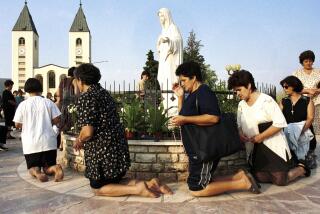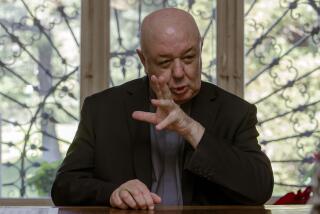3rd ‘Secret of Fatima’ Fuels Millennial Fears for Some
In 1917, or so the story goes, the Virgin Mary descended on Fatima, Portugal, and spoke to three shepherd children. As the sun fluttered and zagged across the sky, Mary imparted what have become known as her three “secrets.”
The first was a harrowing vision of hell and a prediction that while the world war would end, a worse war would follow--which disciples interpret as a prediction of World War II. The second was a call for piety and the consecration of Russia.
The third secret was supposed to be unveiled in 1960, when Pope John XXIII opened it and quickly had it resealed. Though every pope since has read it, and Fatima is viewed as an “official” miracle by the church, the contents of the final message remain unknown to the public.
Now, percolating fascination with the secret has boiled over into the belief among a growing number of Catholics that Mary predicted some sort of apocalypse. With the dawn of the millennium, many of them think the end is about to begin. Though Pope John Paul II has cautioned against millennial fever, some Catholics are convinced that the church has declined to reveal the secret because it predicts catastrophe.
Prophecies of apocalypse and millennial catastrophe are most often associated with evangelical Protestant churches, and nonbelievers typically toss them off as the fascination of a handful of religious zealots. But the burgeoning attention being given to the miracle at Fatima is a reminder of how widespread such beliefs are, especially now.
The Catholic Church officially teaches that the claim by the three children that they saw an apparition of Mary is “worthy of credence.” Tens of millions of Catholics worldwide, including the pope himself, are devoted believers in Our Lady of Fatima.
The number of people who contend that Mary foretold an apocalypse is unknown. But their conviction stems from a common belief among Fatima devotees that she predicted, at minimum, a spiritual crisis for the church.
The church acknowledges that increasing numbers of Catholics are clamoring for the release of the secret, but insists that the fears associated with the sealed message are unfounded. The secret is “nothing of tremendous consequence,” Monsignor Francis Maniscalco, a spokesman for the Bishops Conference in Washington, said this week.
Then why not just divulge its contents? The church won’t answer that.
And that itself appears to be one reason why the Fatima fracas has grown. It’s a maddening mystery begging for an answer, one that isn’t coming any time soon.
“We love secrets. We love detective stories,” said Dr. Gerald A. Larue, a professor emeritus of religion at USC and the author of “The Supernatural, the Occult and the Bible.” Larue--who does not believe Mary visited Fatima--calls the visions “childish hallucinations.”
“It’s dangling in front of you, and there is no way of knowing what’s in it because it’s in the hands of one person. Until that person says what it contains, we won’t know. It may just be bland theology. But the hope for something mysterious, to unravel our destiny, to unravel our future--that’s tantalizing.”
And, for some, agonizing.
Andrew Wingate, the founder of a Minnesota sacred society called the Oblates of St. Therese, believes the millennium will act as the catalyst for political and social unrest that will lead, over the next few years, to an occupation by an Antichrist. And he believes it’s all predicted in the third secret. Not that he’s predicting a sudden end of the earth at midnight.
“People are getting nervous,” he said this week. “There is an inevitability to it. You are going to have social disaster. You are going to have political and economic disaster. You are going to have religious disaster. And then comes the great apocalypse.”
The church is clearly trying to dispel such fears. In 1996, Cardinal Joseph Ratzinger, the head of the Vatican’s Congregation for the Doctrine of the Faith, who has read the secret, said it would be a “perversion” to yield to public pressure to release its text, and said that “the Virgin does not engage in sensationalism; she does not create fear.”
“There is no announcement of the end of the world or any other apocalyptic events in the third secret,” Ratzinger said then.
Maniscalco said it’s possible that the secret was meant for the pope only, and not for the public. He added that the pope has no plans to release the secret. Lucia dos Santos, the only one of the three children who purportedly received the messages who is still alive, is a 92-year-old cloistered nun in Portugal.
“No one can say when Christ will return again,” Maniscalco said. “But the pope has seen [the millennium] as a joyful moment, a moment of recommitment to faith. He’s certainly not called for the celebration of the millennium in an apocalyptic way.”
Forty years ago, when the third secret was on the eve of being divulged at Lucia’s request, Catholics around the world waited with awe and some fear. Legend tells variously that Pope John XXIII fainted or cried when he read the secret, though the church will not confirm that. And when he ordered it resealed without telling the secret, many assumed that it was simply too horrible to reveal. But the furor over the secret soon began petering out.
Pope’s Assailant Wanted Secret Told
Over the years, however, the story of Fatima has attracted an unusual assortment of believers. One was Mehmet Ali Agca, the Turkish terrorist who shot John Paul in St. Peter’s Square. In court proceedings that followed the 1981 attack, Agca claimed he was the reincarnation of Jesus Christ--then demanded that the Vatican “reveal the third mystery.”
Another was Charles H. Keating Jr., the head of Lincoln Savings & Loan, who spent $100,000 of his company’s money on a Fatima movie. A devout Catholic, Keating was prepared to spend $20 million to produce the film, which was apparently about a Soviet plot to assassinate the pope, before he was cornered by federal thrift regulators and became a key figure in the savings and loan crisis of the 1980s.
The assassination attempt itself, for many Catholics, sealed the veracity of the Fatima miracle. The attempt took place on the feast day of the Virgin of Fatima, and legend has it that John Paul was bending down to look at a young girl’s Mary medallion when he was shot; the pope later credited the Madonna of Fatima with saving his life and placed the bullet, removed during surgery, in the crown of a statue to Mary in Portugal.
“That particular miracle didn’t get the press it should have,” complains Kaye Drohan, the host of a Boston-based Catholic television show called “Fatima Today,” who is another believer that catastrophe could follow if Mary’s demands are not heeded.
Fascination over the third secret has been kept alive by believers who string the mystery along by linking it to current events. They point out, for example, that the world’s nuclear arsenal reached new heights in 1960--after the church declined to reveal the contents of the secret--and was followed closely by the Cuban missile crisis, when the United States came perilously close to nuclear war.
Even the war in Chechnya is seen as evidence that Russia--which, for the most part, split from the Catholic Church in the 4th century--is unstable and likely to spread its “errors” into the West. That’s what Mary predicted in her second secret, they say.
“We are in darkness, sheep without a shepherd,” Drohan said.
“Sometimes change has to be put upon us in order to make us see that we are not in total control, that there is a power higher than ourselves who is deeply offended. There may be an intervention, to bring people to their knees. They may say I’m a doomsayer. But to me it’s a normal progression.”
Father Marcel Guarnizo strikes a note between doomsaying and denial. President of Aid to the Church in Russia, Guarnizo just returned from Moscow, where he opened a cathedral dedicated to Mary and the immaculate conception in an attempt to help fulfill her second secret or wish.
“We know that the end of history is going to come at some point,” Guarnizo said. “But the hour and the day is unknown. We have to do what we have to do today.”
More to Read
Sign up for Essential California
The most important California stories and recommendations in your inbox every morning.
You may occasionally receive promotional content from the Los Angeles Times.











